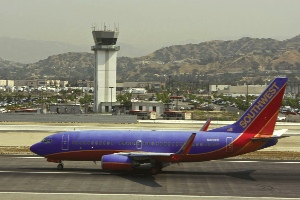Supporters of a mandatory curfew at Bob Hope Airport may now have to hang their hopes on federal legislation to bring quiet to the residential neighborhoods surrounding the airfield. Following the rejection of a curfew by the Federal Aviation Administration on Nov. 2, Congressman Brad Sherman (D-Sherman Oaks) announced he would introduce a bill to prohibit flights between 10 p.m. and 6:59 a.m. with exceptions for emergency and medical flights. Commercial airlines operating at the Burbank airport already follow a voluntary overnight curfew. But as of Nov. 4, no exact language had been produced by Sherman’s office of what would be in the bill and how the curfew would be imposed. Sherman had expressed his concerns to his legislative staff that in turn passed them over to the legislative counsel to draft the bill, an office spokesman said. With no details available it was unknown whether the bill would require similar extensive studies that the FAA required, including a cost-benefit analysis to show that the positive affects of curtailing flights would outweigh the costs. “I am very curious to see how this congressman circumvents that federal process,” said Marc Foulkrod, CEO and chairman of AvJet, an aircraft management and charter firm operating at Bob Hope. Noise generated by aircraft using the airfield has long been controversial, particularly for the Burbank-Glendale-Pasadena Airport Authority and the city of Burbank. The authority spent some $7 million in its Part 161 study that began in 2000 and was submitted to the FAA earlier this year. In its 42-page response the aviation agency found that Bob Hope’s application failed to meet four of six conditions: that the curfew is reasonable, non-arbitrary and non discriminatory; not placing a burden on interstate or foreign commerce; maintaining safe and efficient use of navigable airspace; and not creating an undue burden on the national aviation system. The FAA found shortcomings in the authority’s cost-benefit analysis, including underestimating the costs to business operating at the airport. In its report, the administration cited that general aviation aircraft would likely leave Bop Hope if a mandatory curfew were in place, and UPS would need to shift one early morning flight arriving four days a week to another airport and delay its deliveries to the Burbank area. “On balance, the burden the blanket curfew would impose on interstate commerce and UPS and other similar cargo haulers is not incidental and overrides the local interest in controlling noise level at Burbank in the late evening and morning hours,” the FAA concluded. The airport authority should have known that the FAA would look at their application with a jaundiced eye and reject it, said Jack Keady, an aviation consultant based in Playa del Rey. “The FAA has been loathe to allow curfews,” Keady said. “Their job is to protect aviation and good access. This curfew would have curtailed the access by airlines, freight carriers and passengers.” The application for a curfew drew opposition from aviation and air freight trade groups and raised concerns that if approved private aircraft operations would shift to Van Nuys Airport and other smaller airports in the area. AvJet, however, would have stayed at Bob Hope where it occupies a state-of-the-art hangar powered by rooftop solar panels. The company only flies during the day and uses the most quiet turbine jets available, Foulkrod said. “The rules were clearly outlined and the initiative failed because it did not meet those rules,” he added. The authority has so far been mum on what its next move will be although has the option to challenge the FAA decision in federal court. Authority President Joyce Streator expressed disappointment in the FAA’s decision but the authority remains committed to meaningful nighttime noise relief. “The Airport Commission has not yet had the time to study the details of the FAA’s document and will do so in the next two weeks,” Streator said in a prepared statement.
